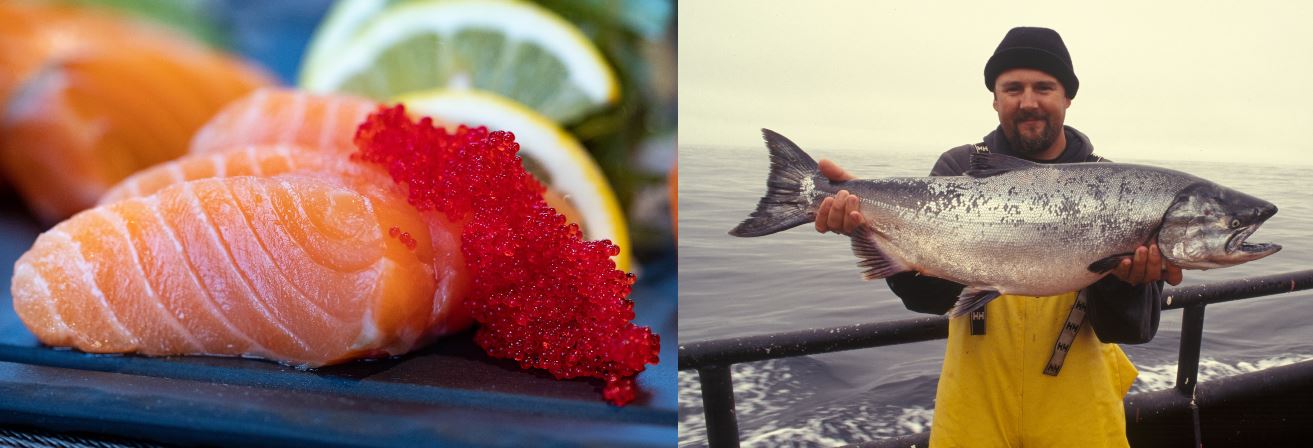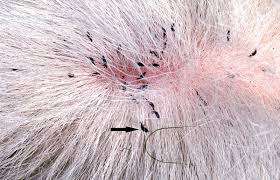Can dogs eat salmon without getting ill?

Can Dogs Eat Salmon?
Owners, including those who are new to dog ownership and those who have had dogs for many years, often ask themselves or others if a certain food is safe for their pets. One of the most common questions about what to feed dogs is whether or not they can eat salmon and other fish. While it's true that these animals naturally love fish (often refusing to eat anything else given the option) there are concerns over whether or not salmon is good for dogs to diet on regularly.
The short answer is yes. Salmon has many great nutritional benefits for dogs and their owners' alike: it contains Omega-3 fatty acids which help keep the heart healthy; acts as an anti-inflammatory agent; aids in the development of the brain and eyes; supports a healthy coat; helps with digestion, and more.In this article, we'll take a look at the science behind salmon and dogs and find out what they need to know before feeding their pups any fish.
Is Salmon Good For Dogs?
Salmon is good for dogs. It has many different types of nutrients that can help keep your pet healthy.
Salmon is high in protein, omega-3 fatty acids, and vitamin D. All of these nutrients are good for dogs to have. Protein is important because it helps keep your dog's muscles strong and his coat shiny. Salmon also provides a decent amount of vitamins that your dog needs to stay healthy as well.
This fish contains many long-chain omega-3 fatty acids which can be beneficial to both humans and dogs alike. These types of fatty acids promote heart health in people and luckily they do the same thing for dogs too! In addition, salmon has a high vitamin D content which may improve bone strength in small breeds like pugs or Boston terriers. Larger dogs will also be able to benefit from this nutrient because it helps keep the nails and teeth strong.
To make matters even better, salmon is low in mercury and high in protein, making it a healthy choice for your dog's diet. It may be good to monitor how much you feed them though since too much of this fish may create flatulence or stomach discomfort.
As long as your dog does not have any allergies to fish then salmon will provide him with a large variety of vitamins and minerals that he needs for optimum health.
As long as your pet is not allergic to salmon than you can add this fish to their diet. Salmon has many nutrients that are perfect for dogs and will keep them in good health if incorporated into their diet regularly.
Include salmon on a regular basis in your dog's diet to enjoy all of its nutritional benefits. The only drawback might be the time it takes to clean up after dinner!
Note: If you are giving your dog canned salmon, then make sure to buy wild-caught Alaska Sockeye salmon since it is considered safe from contaminants like mercury . Some other types of farmed or Pacific caught salmon may have certain types of chemicals in them that could be harmful to your dog.
In terms of toxicity, salmon is very low on the scale and should be fine for most dogs to eat provided they are not allergic to it. Salmon is a great source of protein and healthy fats which can benefit dogs who are underweight or looking to gain weight.
How Much Salmon Can Dogs Eat?
The amount of salmon to feed your dog will all depend on the size and breed of your dog. Large and giant breeds need more protein than small dogs.
The amount of salmon that one should feed their dog each day depends on the size and weight of the dog, but for a large or giant breed adult dog you could start out giving 1/4 to 1/2 pound once or twice per week mixed with other foods. For smaller dogs increase the amount by about half. Increase until your reach what is considered an optimal level of omega-3's while making sure not to overfeed, which can end up hurting your dog in the form of pancreatitis.
Be aware though that raw fish such as salmon may contain E. Coli , so if you are cooking it make sure you cook it well enough to kill any potential bacteria.
SALMON POISONING IN DOGS
Salmon has the potential to poison a dog if it is fed too much too often. Major symptoms of toxicity can include lethargy, weakness, difficulty breathing and muscle tremors.
CAUTIONSSalmon is generally a good source of protein for your dog but you should avoid feeding it to dogs with allergies like fish or shellfish. You also want to be careful about giving salmon to old dogs or small breeds as they may not tolerate the high levels of vitamin D very well.
CAN DOGS EAT SALMON RAW?
Eating salmon raw can cause serious problems for your dog because of the bacteria in raw food. This is especially true since dogs don't have a very developed sense of taste, so they'll likely eat anything you put down for them. Eating raw fish can also cause a vitamin B12 deficiency which could be fatal.
Benefits of salmon to dogs
Salmon contains nutrients that benefit both skin and coat in dogs including omega 3 fatty acids, essential fatty acids, vitamins A, B12 and C as well as iron and zinc . These are all important for good health on their own but combined make salmon an excellent choice to support a healthy immune system and keep your dog happy. Here is a list of all the nutrients available in salmon:
- Omega-3 fatty acids - Omega- 3 fatty acids are part of the family of polyunsaturated fatty acid s that can help keep your dog's coat shiny and skin healthy. Salmon is a great source of omega-3s for dogs.
- Salmon contains vitamins A, B12 and C - These enhance your dog's immune system, energy and nervous system respectively.
- Iron and zinc - Iron enhances red blood cell production while zinc helps metabolize proteins to build muscle more completely which can help with growth in puppies.
- Protein - Protein is a necessary building block for the body. It is important to note that protein from animal sources are "complete" meaning they contain essential amino acids which support the immune and digestive systems of dogs in particular. Protein also helps burn fat more efficiently.
- Salmon is a great source of potassium - This prevents muscle cramps and stiffness by keeping your dog's fluid levels balanced.
- Salmon also contains Vitamin B6 and magnesium - These vitamins help your dog's immune system function correctly therefore supporting the overall health of your pet.
- Salmon is high in selenium - This prevents cancer and supports your dog's heart by protecting it from disease.
There are also some other benefits your dog will experience.
- Much Healthier Skin and Fur
- Immune System Gets Stronger
- Joints Get Improved Mobility
- Allergies and Skin Irritations Improve
- Brain Function Increases
- Collagen Production Increases
- Cancer Cell Growth Slows
- Help With Inflammatory Bowel Disease
- Helps With Weight Loss in Dogs That Are Overweight
CAN DOGS EAT SMOKED SALMON?
Smoked salmon is salmon that has been cured by smoking. Since salmon itself is high in sodium, smoked salmon usually contains a similar amount of salt as well.
There's also the risk that the smoke used to cure it will contain carcinogens. So, for both nutritional and health reasons, your dog should avoid smoked salmon.
Please remember that moderation is key when it comes to giving your dogs any type of food item, including canned salmon. You don't want your pet to become overweight or sick from eating too much protein. Not only can tummy troubles occur when there's too much meat in their diet, but excess protein can lead to loss of calcium if your pup isn't getting enough calcium in his diet as well.
Can salmon be harmful to dogs?
Salmon has actually been linked to causing diarrhea in dogs, thanks to its high protein content. Salmon also lacks some nutrients that most dog foods contain, like calcium and Vitamin B-12.
This is especially true when it's served as a standalone meal or treat. Serving size is important! Always remember to feed your pup the recommended amount of food on his diet label, and watch out for what other foods you serve with your salmon.
Salmon caught in certain parts of the world have been known to contain toxins. These toxins can be dangerous to your dog, so you may want to avoid bringing salmon caught in those regions into your home.
Toxins that are sometimes present in salmon
- Furans
- Radiation
- PCBs
- Dioxins
- Heavy Metals
- Parasites
These are found in many types of fish, including salmon. They're known to cause cancer and reproductive problems, even at low levels.
Radiation will sometimes be found in fish that have been exposed to nuclear waste or power plant accidents. This can cause a range of health issues, as well as mutation and cancer.
These are known to increase cancer risk in humans, and they have also been known to cause problems in dogs. PCBs can be found in some farmed salmon species.
These are present in some foods that have been exposed to chemicals during the manufacturing process or from contaminated animal feed. This includes farmed salmon, so be sure to purchase organic salmon if you plan on feeding it to your dog.
Heavy Metals are present in many fish, but are present in farmed salmon at higher quantities than wild salmon. This is because of the type of food that they eat and how they are raised.
Fish may contain parasites like tapeworms, flukes found in fresh or salt water-based environments. It's recommended to cook seafood thoroughly before feeding it to your dog. Cooking kills all parasites inside the meat of the fish. You can use this chart to determine if any types of raw seafood you're thinking about feeding yourself or your pet might be risky for you to consume due to a parasite risk - eww!
Salmon Poisoning In Dogs
Salmon poisoning in dogs is usually caused by eating raw fish. Although not all species of salmon are toxic to dogs, the risk is present with any type.
Salmon poisoning in dogs is extremely dangerous because animals can develop a life-threatening illness (salmon poisoning) within 24 hours. In addition, there's no known antidote for this syndrome, so prevention is key. Salmon has to be prepared properly if you want your pup to eat it without harm.
Salmon poisoning in dogs is caused by thiaminase, and the signs are similar to those of propionic acidemia (PA) in humans. Thiamine or vitamin B1 is important for normal cellular function and specifically affects brain and nerve cells. Because salmon have a high level of thiaminase, which destroys thiamine, they can cause illness when eaten raw or undercooked.
Signs that your dog might be poisoned by salmon
- Confusion
- Increased Heart Rate
- Tremors
- Vomiting
- Seizures
- Coma
- Frequent Urination
- Extreme Thirst
Conclusion
If you've ever seen the movie "Jaws", you might think twice about including salmon on your dog's menu. After all, what could possibly be safe about an animal that looks like both a shark and a piranha? The truth is that this ocean predator is actually quite healthy for your dog to eat if it's prepared properly. First of all, when choosing salmon as food for dogs, you should only purchase farm-raised versions from reputable sources if thats the only option you have. The better option would be to only feed you dog wild caught salmon, but care needs to be taken when catching wild salmon. Wild salmon caught in certain parts of thev world are just as dangerous as farm-raised salmon.






